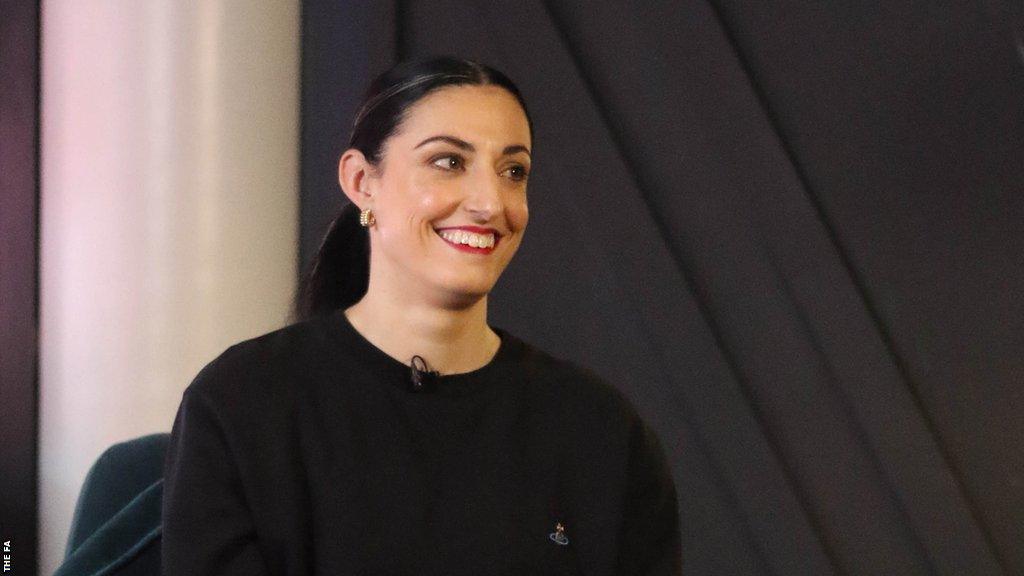WSL takeover: Where has the process reached and what questions have been answered?
- Published
WSL job is the most exciting opportunity in sport - NewCo chief Doucet
It is only six months until the independent club-led body known as NewCo takes over the top two divisions in women's football - so what do we know so far, and how far has the process reached?
The Football Association (FA) has overseen the growth of professionalism in the Women's Super League (WSL) since 2010 and introduced a second tier - now called the Women's Championship - in 2014.
With NewCo set to take over at the end of the season, there are many questions and issues that still need addressing.
NewCo chief executive and former Nike director Nikki Doucet says the aim is to target a "unique audience" in women's football and set aside "judgement and direct comparison to the men's game" in order to capitalise on potential growth.
Here is the latest on NewCo's plans and what still needs to change.
What are the next steps?
NewCo is set to become independent from the FA in the summer.
From that point on, it can make changes to the structure of the league, agree new broadcast deals, invest in new technology and officiating, and implement rule changes, among a whole host of other things.
But Doucet says they are still "working through legal documentation" and there is unlikely to be many changes before the start of the 2024-25 season.
"We have what we believe the structure is, and then it just takes time," said Doucet.
"Basically we have put forward a proposal, which I call 'Project Moonshot'. When I worked at Nike, we always talked about 'where the consumer is going next' and to try and imagine what doesn't exist yet. We would call those 'moonshots'.
"It is a proposal that all the clubs agreed to, and right now we're working through the legal transition of coming out of the FA into the independent group.
"The clubs will own the NewCo - the independent company - and the FA will have a special share within that, as they do with the Premier League."
Doucet says the priority is understanding the fanbase and "creating a company that obsesses over that". She stressed it was "a journey" and it will take time to implement changes.
What are the biggest issues NewCo needs to address?
Doucet said NewCo "agree with all the recommendations" made in ex-England midfielder Karen Carney's fan-led review but was reluctant to "put a number on" the financial ceiling after it was proposed it could become a "billion-pound" business.
Another of the review suggestions was to allow women's matches to be broadcast during the Saturday 'blackout' slot at 15:00 UK time, when games are currently prevented from being shown on live television in the UK. Doucet said NewCo is "exploring" that option.
She said there were no intentions of making the WSL a "closed league" effectively getting rid of promotion or relegation, meaning there will still be 12 teams in both leagues next season.
She also confirmed that the Women's League Cup competition will continue, and negotiations over a new broadcast deal - which is set to run out at the end of the year - are ongoing.
"We're in the market. We're having conversations with the broadcasters now," said Doucet. "When we think about the broadcast [deal], for the fans, we have to make it as easy as possible to watch the league."
When questioned about a potential expansion of the WSL in the future, Doucet said it is "something we'll look at".
The structure of the new board is also still to be decided, alongside the potential addition of video assistant referees (VAR), 'VAR Lite', and full-time referees.

Former Nike director Nikki Doucet is NewCo's chief executive.
Who is Doucet and what is her inspiration?
Selected from more than 100 applicants, Doucet was initially appointed as a consultant to lead the takeover discussions and oversaw four workshops with club executives.
Canada-born Doucet played basketball to a "relatively high level" at university and trained with male athletes in an elite environment.
"They let me play because I was good. I had respect as a female athlete and I know what that looks like," she said. "I have experienced what it is and I can see that possibility [for football].
"I see a world where women's sport and women's football in particular changes the world. I believe in the power of sport, and I have seen what it has done in my life for me personally."
Doucet had former USA striker Mia Hamm's poster on her wall at university and remembers watching their victory at the 1999 Women's World Cup.
"That's the only time I saw her play," said Doucet. "If you look at women's sport over the last 50-100 years, it has been underfunded. It has been treated like a charity and expected charity returns.
"Now you're starting to see professional management come in with real investment and strategies. I see it as just the most amazing opportunity.
"The experience of going to a women's match is more like a Glastonbury experience - it's a festival experience. That's a very different fanbase. That's what we need to bring to life. Who doesn't want to be part of that? This is the future."